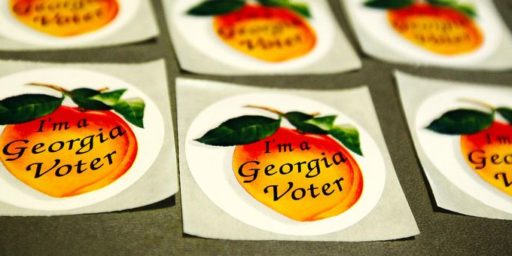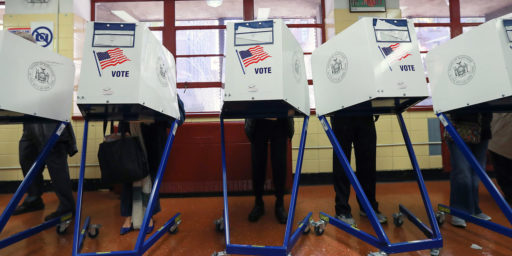You Are What You Tax
Sociologist Charles Murray [RSS] proposes an interesting “thought experiment” on taxes. He argues that, if people had to pay the same amount for taxes as they do now but could allocate spending, they’d make different choices:
Police, fire, water and sewage, courts and prisons and national defense will get far more money than they would ever have the nerve to request. The allocations for national parks, environmental protection, air-traffic control and highways will probably be many times their current budgets. But my first point (match my prediction against your own choices) is that almost all the choices will be for tangible services. Most of them will be for services that fall under the classic understanding of a “public good” — something that individuals cannot easily provide on their own and that is shared by all (police protection, clean air).
My second point is that allowing taxpayers to name where their tax dollars go would put large segments of local, state and federal government out of business. To see what I mean, go to the Web and bring up the organizational chart of any government department. Some of the boxes will catch your eye as something you might like to support (mine safety, the national archives) but there will be plenty of other boxes about working groups, directorates for planning or administration or diversity, offices of compliance exemption or regulatory development, all of which sound like a ton of bureaucracy for an ounce of output. Might you use your tax dollars to support a mine inspector or an archive curator? Quite possibly. Will you line up to support any of the boxes that sound like gobbledygook? Unlikely. Much of the apparatus of government does nothing that ordinary people, making sensible judgments, would willingly pay government to do.
This is certainly true. In many ways, government would be improved under this construct; a lot of programs got put into place for now obscure reasons and persist because of simple inertia.
It’s also true, though, that much of this stems from the fact that virtually none of us actually understands the complexity of the system. Plus, people have no idea what various programs cost. Jesse Jackson had the odd mantra that it was cheaper to send a kid to Yale than to send him to jail. It was both silly (sentencing murderers to an Ivy League education would have unpleasant externalities) and pithy (giving people opportunities makes them more likely to be good citizens). But the cost of something and the value of it aren’t always related. For example, my water bill is substantially lower than my DirectTV bill, even though the former is far more important.
Under present circumstances, we could probably use more soldiers, cops, firefighters, and courts. But just because they’re the most fundamental services that government provides doesn’t mean that the demand for them is infinite. Tripling the size of the fire department for a small town that has perfectly adequate fire protection wouldn’t make much sense. And just because the average man on the street (or, indeed, the average political scientist) doesn’t know what a given bureaucratic department does, it doesn’t mean that they’re not doing something of significant value.
(Hat tip: Stephen Green)



![[Update] Analysis of NARA's Letter to Former President Trump](https://otb.cachefly.net/wp-content/uploads/2018/02/top-secret-stamp-magnifying-glass-clearance-large-512x256.jpg)


And just because the average man on the street (or, indeed, the average political scientist) doesn’t know what a given bureaucratic department does, it doesn’t mean that they’re not doing something of significant value.
Understanding that this is only a “thought experiment,” this approach would have the added advantage that the need for particular government services would have to be marketed to the taxpayers. It would have to be stated in plain English, and justify the service in a short “executive summary.” If you need reams and reams of paper to justify something, that’s a strong signal that it’s not really justifiable.
…virtually none of us actually understands the complexity of the system.
I’m not even trying to be humorous when I say that “us” includes the legislators who created the behemoth.
By extension, many of the people who scream “democracy, democracy” all the time would have all their hair fall out if they ever saw what a real plebiscite would do to many of their cherished ideas and programs.
It’s not by accident that the founders chose to found a republic.
Boyd and M : Correct on both counts. Intertia is a big factor, not to mention logrolling and pork barrel. And I’m not arguing that all bureaucracies are worthwhile–I’m sure a great deal wouldn’t stand rational scrutiny. But a lot of them that don’t appear to make sense to the casual observer are likely quite valuable.